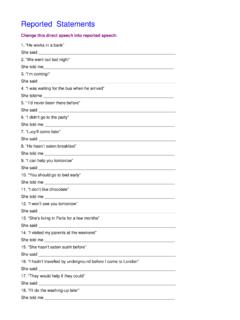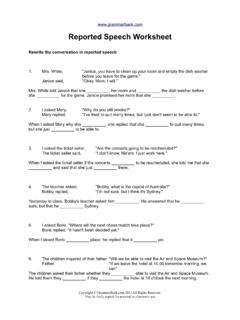Transcription of 2012 - Lezione 2 maggio 2012 - Reported speech
1 Reported speech The words or thoughts of a person can be expressed through direct speech in this case we repeat the (more or less) exact words that were said or filtered through the language and the memory of the speaker, changing pronouns, tenses and other words if necessary: this is known as Reported speech , also called indirect speech . Words spoken or thought by one person in one place at a certain time may be Reported , by that very person or by someone else, in a different place and at a different time. That is why it is often necessary to make grammatical changes (generally quite obvious) to the structure of a sentence when shifting from direct to indirect speech . Often, pronouns must be changed, as well as deictic expressions of time and place, such as now, here, this etc.
2 , depending on when and where the reporting occurs in relation to the original words: Bruce: I want to start decorating next week (direct speech ) Bruce said he wanted to start decorating the following week (indirect speech ) Here are some of the most common changes taking place when shifting from direct to indirect speech : Now Then Tonight That night Yesterday The day before / on + name of day This morning That morning Last week The previous week/the week before Ago Before/previously Tomorrow The following day/the day after Next Monday The following Monday Next week The following week/the week after This That/the Here There
3 This + name of the place That/the + name of the place The conjunction that, which follows many reporting verbs, is often dropped, especially after the most common verbs, such as say, tell, or think. However, it cannot be dropped after certain verbs, such as reply or shout: You say (that) you don t remember where you were the night of the murder She thought (that) they were making a big mistake He replied that he had done everything in his power As we shall see, statements, questions, and offers/requests/commands etc. are Reported differently. The most important thing when discussing Reported speech , though, is to focus on the tense changes that occur when passing from direct to indirect speech . Tense changes A change of time may involve a change of tense.
4 In fact, quite obviously, the tenses used in Reported speech relate to the time when a person is making the report, not to the time when the original words were used. If the reporting verb is in the present, present perfect or future the tenses usually stay the same as in the original: I want to quit this job . He says he wants to leave his job. There was another plane crash last night . They have said there was another plane crash last night. I don t think this is a good idea . I ll let them know you don t think this is a good idea. On the contrary, after past reporting verbs, the tense of the original sentence is usually backshifted (though not always, as we shall see below): We will consider your proposal . He said they would consider my proposal I don t accept the terms of the contract.
5 She said she didn t accept the terms of the contract. I can t answer the phone. I m having a shower . Thomas said he couldn t answer the door because he was having a shower. I ve made a decision . She announced she had made a decision. The following table summarizes the general tense backshifting rule, which applies when the reporting verb is in the past the tense (on the contrary, as we have seen there is no tense modification when the reporting verb is in the present, present perfect or future). Notice that the past tense and the present perfect have the same forms in indirect speech : Speaker s words Reported speech Present simple Past simple Present continuous Past continuous Present perfect simple Past perfect simple Present perfect continuous Past perfect continuous Past simple Past perfect simple Past continuous Past perfect continuous Going to future Was/were going to Shall/will Should/would Must Had to Can Could May Might The backshifting of tenses in Reported speech means that, sometimes, past tenses are used to talk about present or even future events.
6 This can happen because the backshift is automatic and does not necessarily indicates past time : I knew you were watching TV! You said we could leave next week If a reporter refers to a timeless, permanent condition or talks about a situation that is still present or future, just as it was for the original speaker, the verb tense used by the original speaker can be backshifted or retained. Consider the following examples: There will be a change of political alliances soon . He said there will/would be a change of political alliances soon Have you got a new car? . He asked if I have/had a new car Past simple and continuous often remain unchanged if the time/sequence of the actions described is clear. The past simple does not change into the past perfect when it is not necessary to show the time relationship between the events that are talked about and the original speech , when the past events are seen by the reporter from the same point of view as by the original speaker.
7 In the first of the following example it is necessary to specify the time sequence of the actions, in the second and third it is not: He said he was sorry he had arrived late but his boss had kept him in the office The newscaster said there was an earthquake in India yesterday (not: *there had been an earthquake) During a rally last week the leader of the Opposition asserted that the Prime Minister knew there were no weapons of mass destruction in Iraq (not: *the Prime minister had known .. there had been no weapons ..) The past simple used in a time clause does not change, while the verb in the main clause can change into a past perfect (but it usually stays the same when it refers to a situation that still exists in the present): When I called her she was still at home.
8 He said that when he called her she was/had been still at home. The past continuous remains unchanged when referring to an action in progress, while it can be changed into past perfect continuous if it refers to activity that precedes another activity expressed in the past simple or present perfect: I was studying last night at ten . She said she was studying last night at ten We were demonstrating peacefully but then the police charged . He said they had been demonstrating / were demonstrating peacefully but then .. Reporting modals Some modals have a past form that can be used for indirect speech backshifting: can could may might shall should will would Modals that have no past forms (must, should, would, could, might and need) usually remain unchanged after past reporting verbs: You might be wrong.
9 She said I might be wrong. You needn t do it . He said I needn t do it. You should try to get here on time . He said I should try to get there on time It is important to remember that, when it possesses a strong performative meaning expressing obligation, must usually remains unchanged or is substituted by was/were to. However, in other cases must and should can be substituted by had to or was/were to. In particular, had to is often used as the indirect speech form of must: You must hand in your papers by next week! The teacher said we must/were to hand in our papers by the following week You must turn off your mobile phones before entering the school . The Headmaster said students had to turn their mobile phones off before .. You must come with us! She said we had to go with them.
10 Future in the past Do no confuse Reported will future with third type conditional (which, of course, can also be Reported ): The conflict will end soon in the region. They said the conflict would end soon in the region (not: *the conflict would have ended soon ..) They admitted they would have changed sides if their requests had not been met (third type conditional) Reported questions The rules about tense changes apply to questions in the same way as they do to statements. Remember that, when reporting wh-questions, the order of subject and verb is not inverted, and thus auxiliary do is to be found only in indirect negative questions; when reporting yes/no questions if or whether are put before subject + verb: They asked me when I was leaving They wanted to know why I didn t accept their offer They asked me if/whether I had decided to leave the country Questions beginning with who/what/which + be can ask for a subject or a complement: What is the problem?










